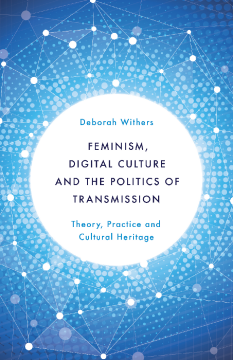
Additional Information
Book Details
Abstract
Feminism, Digital Culture and the Politics of Transmission argues that despite the prevalence of generational narratives within feminism, the technical processes through which knowledge is transmitted across generations remain unexplored.
Taking Bernard Stiegler's concept of the already-there as its starting point the book considers how the politics of transmission operates within digital culture. It argues that it is necessary to re-orient feminism's political project within what is already-there so that it may respond to an emergent feminist tradition.
Grounded in the author's work collecting and interpreting the music-making heritage of the UK Women's Liberation Movement, it explores how digital technologies have enabled empassioned amateurs to make 'archives' within the first decade of the 21st century.
The book reflects on what is technically and politically at stake in the organization and transmission of digital artifacts, and explores what happens to feminist cultural heritage when circuits shut down, stall or become diverted.
Following in the footsteps of other recent studies on feminism’s ‘already-there’, Deborah Withers’ focus on the music archives of the WLM provides a vivid and compelling illustration of what this means in practice, as well as extending its theoretical implications through her astute re-imagining of transmission and digitalisation. Highly recommended.
Lynne Pearce, Chair of Literary Theory, Lancaster University
With astute theoretical insight, oral narratives, and personal accounts, Withers reminds us that feminism’s archive is a rich “heritage resource” that does more than transmit history—feminism’s archive is also the carrier of values, knowledges, cultural forms and practices that are as vital to the past as they are to the present and future. Original and meticulously researched, this book contributes to a growing dialogue on feminist archives and generational politics while also documenting British feminist history in the late twentieth to early twenty-first centuries
Kate Eichhorn, Associate Professor, The New School
Deborah Withers is an independent theorist, researcher and trustee of the Bristol-based Feminist Archive South.
A substantial, judicious, and highly effective mobilisation of key tenets of Stiegler’s work pertaining to memory, technology, and cultural transmission. Withers develops a cogent political reformulation of questions of memory, heritage, and archival matters of preservation and access in the digital age in this book project. Her use of Stiegler is central to this, and indeed represents an important introduction to his philosophical critique of the digital mediated world to an area where his ideas have particular relevance but are under-represented.
Patrick Crogan, Associate Professor of Digital Cultures, University of the West of England
